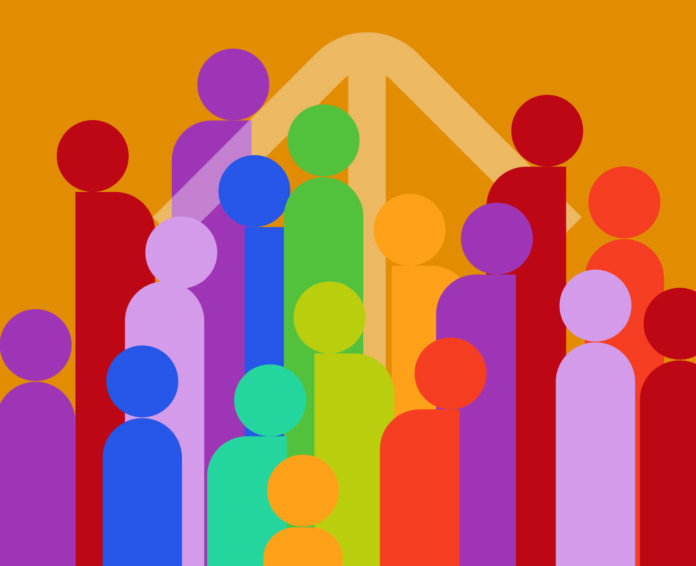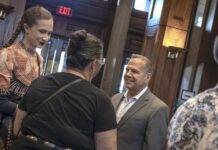All across New England, LGBTQ+ organizations do amazing, life-affirming, often lifesaving work to support our community. But who’s supporting them? For pro-LGBTQ+ programs and initiatives to survive and thrive, they need support too.
Stepping up to offer that support are dedicated funds throughout our six New England states—some based within major philanthropic foundations, others scrappy grassroots orgs themselves, all sharing similar missions to uplift all LGBTQ+ people in our region. They help us stand up to backlash from the far right at school boards and state houses. They provide support for health care, housing, food assistance, youth and legal services. They make possible the work of LGBTQ+ artists, teachers, librarians, support group leaders, camp counselors, Pride event organizers, you name it. Some don’t just back LGBTQ+ groups but individuals too, through scholarships and other initiatives.
These folks are there for all of us, doing extraordinary work we can all take Pride in.
Equality Fund, Boston Foundation
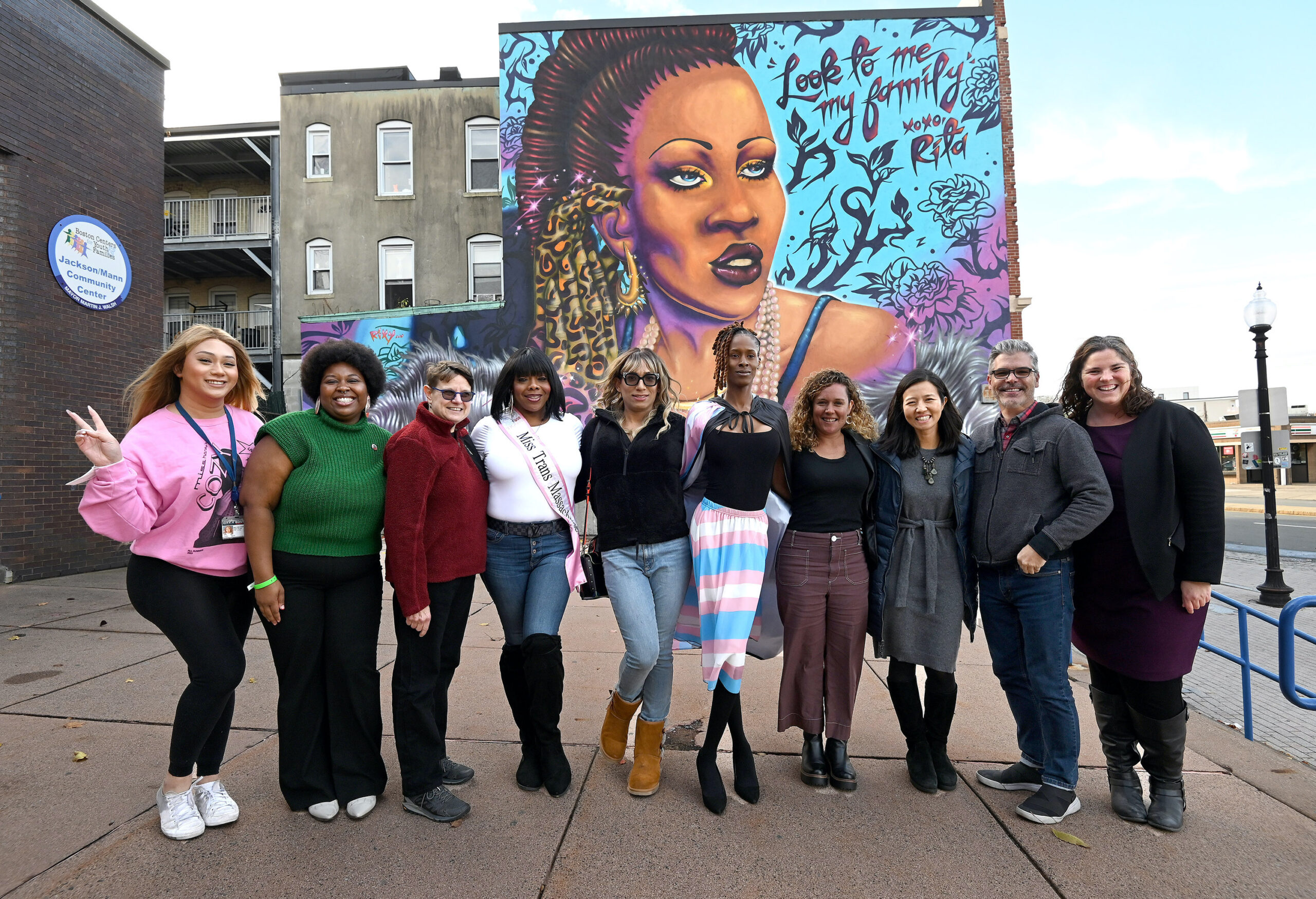
Massachusetts
If you think philanthropic funds are just about giving out money, let us introduce you to Scott Knox, director of the Equality Fund at the Boston Foundation.
“There is an untold story of the role of philanthropy in the building and strengthening of the queer, trans and broader LGBTQ+ communities in New England,” says Knox, who came on board last summer as the Fund’s first director since it was established in 2012.
In addition to grantmaking, Knox explains, the Fund also advocates for policy, cohosts public forums and networking events called “convenings,” and invests in research that supports systemic change on behalf of the LGBTQ+ community—none of which takes away from the grantmaking.
Since the Equality Fund awarded its first grant in 2013, they’ve provided nearly $2 million to some 90 LGBTQ+ organizations throughout the Commonwealth. Last year alone, they distributed $346K, and in 2024, once their 12th annual call for appeals is completed, another $370K will back a spectrum of LGBTQ+ initiatives at both well-established nonprofits and newcomers alike, large and small.
Says Adrianna Boulin, president Boston Pride for the People, “We are grateful for the Equality Fund’s investment in something new and unknown and for alignment with our vision to address racial and ethnic inequities that exist within the LGBTQ+ community.”
All Equality Fund grantees are determined by an advisory board made up of members of the LGBTQ community and allies “who possess a breadth of understanding about the most pressing issues affecting our community today,” says Knox.
Grant money comes from an endowment raised by over 130 donors who’ve contributed some $3 million, and they are about to launch a capital campaign to significantly further bolster the funds. (More on the campaign coming soon!)
Turning back to the fund’s broad range of mission, “How can the Equality Fund underwrite, support and create space for community conversation, public discussions around issues that are important to the community?” asks Knox.
One answer is by cohosting gatherings like the recent “Trans Creative Storytelling Workshop” with the Mass Transgender Political Coalition. At this event, trans narrative archivist Jess Freidin created a safe and engaging virtual space for trans and nonbinary individuals and their partners, families and allies to think about how and why trans lives matter.
Or the upcoming “fireside-chat format” talk with Rev. Brandon Crowley, author of the new book “Queering Black Churches: Dismantling Heteronormativity in African American Congregations,” on May 22.
Or the youth-led conversation with Neema Avashia, author of “Another Appalachia: Coming Up Queer and Indian in a Mountain Place,” cosponsored by the Asian Community Fund, on June 6. (The Equality Fund often partners with other Boston Foundation Funds, as well as other groups doing great work throughout the Bay State.)
Another answer to how the Equality Fund is making a difference beyond writing the checks is through initiatives like their ongoing partnership with the Fenway Institute and the Mass. Dept. of Public Health.
This team is currently conducting research to deliver a follow-up to their 2018 report, “Equality and Equity: Advancing the LGBT Community in Massachusetts.” The new report will provide an updated and comprehensive portrait of the LGBTQ+ community. Due for release this fall, the report will focus on particular needs of youth, older adults, transgender and gender diverse individuals, BIPOC individuals and the intersection of these populations. And the Fund’s work on the report doesn’t stop there. After its release, they’ll be hard at work getting the word out to practitioners, policymakers, public leaders and others who support the community.
“The Equality Fund has been very involved every step of the way,” says Fenway Institute Director of Health Policy Research Sean Cahill. “Their role has been very hands-on—conceptualizing the scope of the project, what the scope of the report will be, what kinds of data we’re looking at, and so on.”
“The Equality Fund provides support to a lot of organizations that are doing important work on the front lines for our community,” says Cahill. “The work they do is absolutely critical.”
LGBTQ+ Fund, Greater Lowell Community Foundation
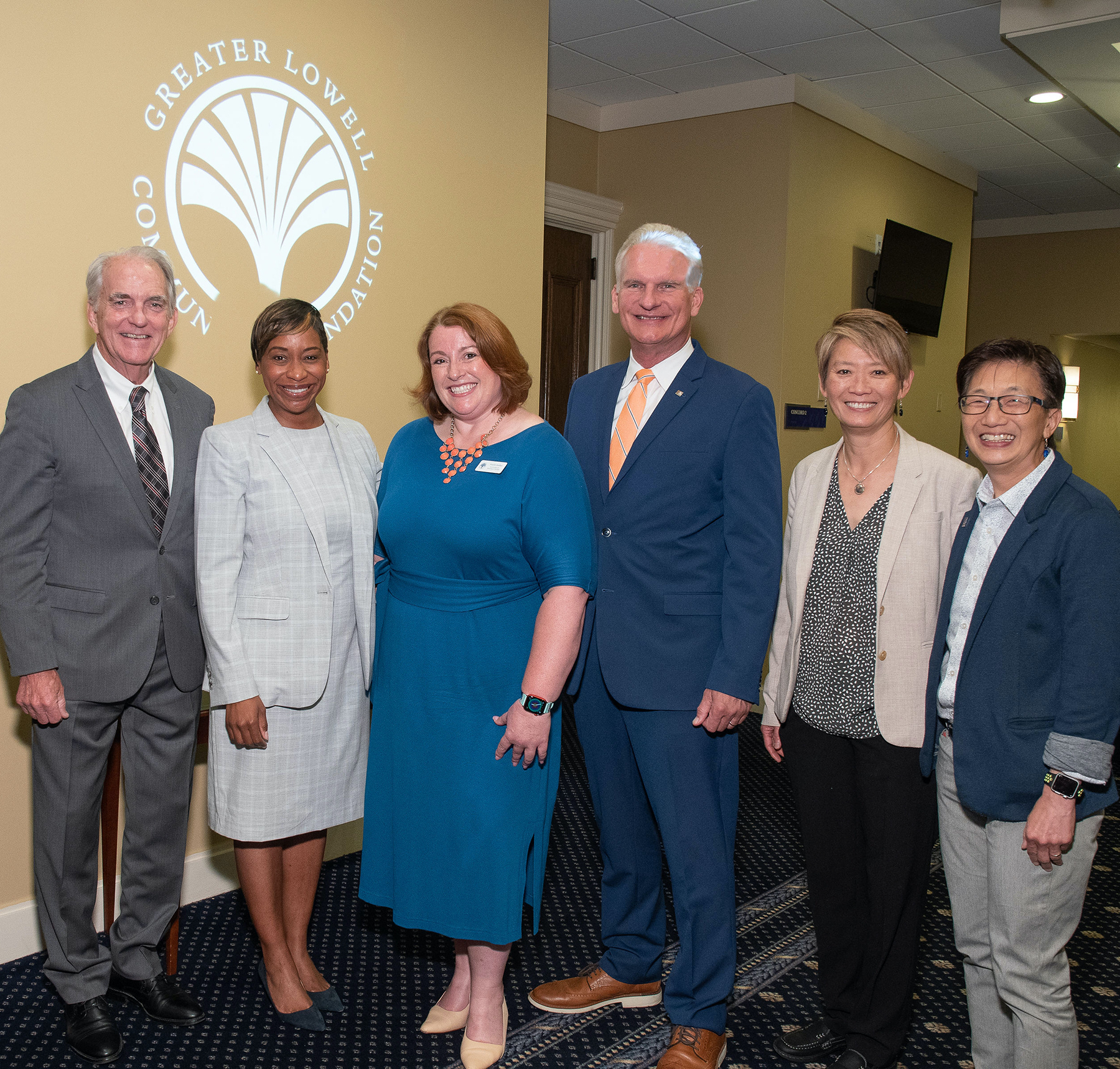
Massachusetts
June 15, 2024 is an important date for the LGBTQ+ community of Greater Lowell.
That’s when the first local nonprofit organization will receive the first-ever grant from Greater Lowell Community Foundation’s LGBTQ+ Fund.
The ceremony—complete with a festive brunch, mimosa bar and DJ Mocha—coincides with Greater Lowell’s Pride parade and festival, which immediately follows so guests can march, stroll, sashay or otherwise easily make their way from one joyful event to the next.
“We’ll have some breakfast, some fun, maybe some dancing if people feel up for it at 10 a.m. I sure will be,” says Susu Wong, a marketing executive at Tomo365 and cofounding member of the Massachusetts LGBT Chamber of Commerce. She and her wife Julie Chen, the first LGBTQ chancellor in the UMass college system, donated $25,000 to start the fund.
A short speaking program, featuring History UnErased Founder Deb Fowler, is also on the agenda. “Deb is magic!” adds Jennifer Aradhya, GLCF vice president for marketing, programs and strategy. “As a former teacher in the Lowell school system, someone dishonorably discharged from the military [prior to Don’t Ask, Don’t Tell] who recently reconnected with the military, and all she is doing with History UnErased [with its mission to put LGBTQ history “in its rightful place—the classroom”], she’s got an incredible story.”
But most exciting for Wong and Chen is to see the dream of the fund they envisioned, announced just one year ago, become reality.
Life partners for more than 30 years, they started the fund as a way to give back to their local LGBTQ community. Only 5 percent of the fund’s endowment will be awarded annually, but the plan is to grow that endowment so that 5 percent will get bigger, the grants larger and the community ever-so much stronger.
The greater goal?
To support and improve the quality of life for LGBTQ+ people in all of the region’s 21 cities and towns—from Ashby to Wilmington east to west, and Dracut to Concord north to south. And they’ll do that through annual giving to nonprofits providing legal, health, education, advocacy and other high-demand services and programs like the one to be announded at the brunch fête on June 15.
“We have a lot of places that really need help,” notes Wong. “Today’s world is very stressful, and things aren’t going the way we want, so it’s important that we all be activists and support one another,” she told Boston Spirit earlier this year. “There are still communities near us that don’t recognize Pride, that have trouble raising their Pride flag.”
Providing guidance and support is the Greater Lowell Community Foundation where the fund is managed. Since its founding in 1997, the GLCF has awarded more than $35 million to the region’s organizations and more than $500K in scholarships annually, and manages some 400 other funds as well.
“This is the first endowed fund that has been established in the five years I’ve been at GLCF, and it is the most important one as far as I’m concerned,” says Aradhya.
“So I’m going to say this in front of Susu. What was so generous is, many people who give funds keep it as a donor-advised fund. They want to keep the control, they want to determine who it goes to. But by doing an endowed fund, [Wong and Chen] are giving the control to the community. We are going to have a selection committee, volunteers from the community with particular interests and experience, do the selection of the grants annually. That will go on long after I’m around, longer than Susu and Julie are around—forever.”
Equity Action Fund, Rhode Island Foundation
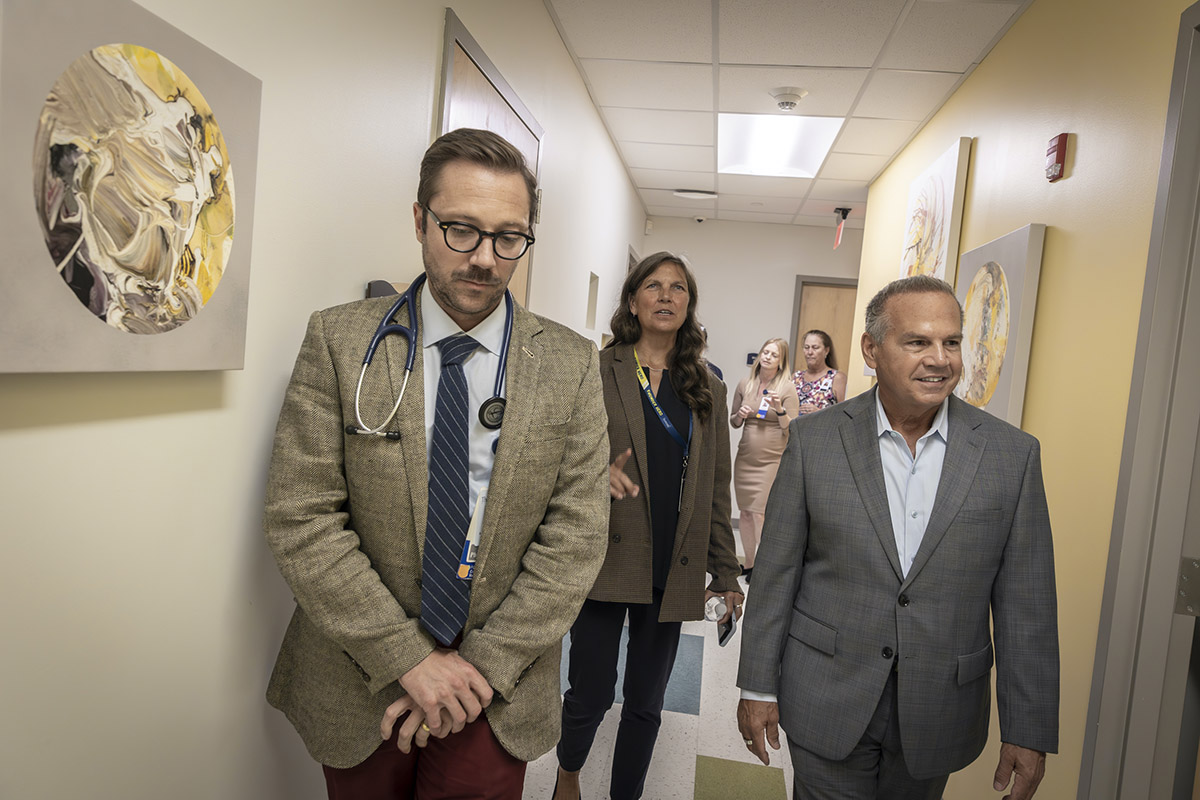
Rhode Island
When former US Congressman and Cochair of the Congressional Equality Caucus David Cicilline left Washington last May after more than 12 years in federal office, it was still a big win for the people of Rhode Island who he served.
Cicilline, who’d prior to Congress served as mayor of Providence, moved immediately to the helm of the Rhode Island Foundation.
“It was an opportunity to return to the state that I love, to work on all the issues I’ve worked on in my almost 30 years of elective office, but also to do it at a place where there were resources available, and investments being made to actually get things done in each of these areas in a very significant way,” Cicilline tells Boston Spirit.
“And so I got to move home, work for the state that I love, work on all the issues that really matter to Rhode Island and work in an environment where people are working together to try to get things done that will make a difference in the lives of Rhode Islanders.”
Last year alone, the Foundation awarded $89 million to some 2,500 nonprofits.
Over the past several years, Cicilline says, the Foundation has doubled down on equity, “making sure that all we’re doing has applications to everyone in Rhode Island, and everyone in Rhode Island has a chance to succeed, particularly in communities of color and also the LGBTQ community.”
As Congressman and Mayor, Cicilline has always worked to improve the lives of all constituents and Americans. But as an openly gay man and long-term leader in the Congressional Equality Caucus, he also brings unique insight for queer concerns.
Since the Foundation’s Equity Action Fund was established in 2002, it’s provided more than $1.2 million in grants to organizations supporting, advocating for or serving LGBTQ Rhode Islanders. It’s also community-driven as an advisory-led program, notes Cicilline, “meaning there’s a committee made of members of the community that make recommendations.”
When he arrived on the job, work was underway on a report on the status of the LGBTQ population of the state in a variety of important areas like health care, housing, education and more. But Cicilline also wanted to ensure part of the report included a set of action steps for the Foundation to address. The report is slated for release in June.
Meantime, the work goes on.
Each year, Equity Action distributes approximately $60K in grants to the community. Last year, the grants ranged from $2,500 to $10K, and went to the Dr. Martin Luther King Jr. Community Center, Family Service of Rhode Island, the Sandra Feinstein-Gamm Theatre, the Girl Scouts of Southeastern New England, GLBTQ Legal Advocates & Defenders (GLAD), Haus of Codec, Meals on Wheels of RI, Newport Pride, Project Weber/RENEW, the Providence Public School District, “Queer. Archive. Work.,” Sojourner House, Youth Pride Inc., The Steel Yard and Open Door Health Clinic at the Rhode Island Public Health Foundation.
“We will use this grant to solicit community input about our new behavioral health services and to provide care in ways that best serve our LGBTQ clients,” says Dr. Amy Nunn, executive director at grantee Open Door Health.
Says Julio Berroa, executive director of grantee Haus of Codec, “Our six shelter beds provide young people with the safety and stability that enables them to access the services they need to thrive.”
Says Janson Wu, former executive director at grantee GLAD, “LGBTQ+ families and youth are facing unprecedented and rising attacks and hate, both nationally and here in Rhode Island. Our work will strengthen the state’s protective legal framework for LGBTQ+ residents.”
Says Cicilline, “We’ve seen a rise in political violence, antisemitism and anti-LGBT violence. It makes everyone’s work in our community, including community foundations, even more urgent and more important. We take that responsibly seriously here at the Rhode Island Foundation.”
Samara Fund, Vermont Community Foundation
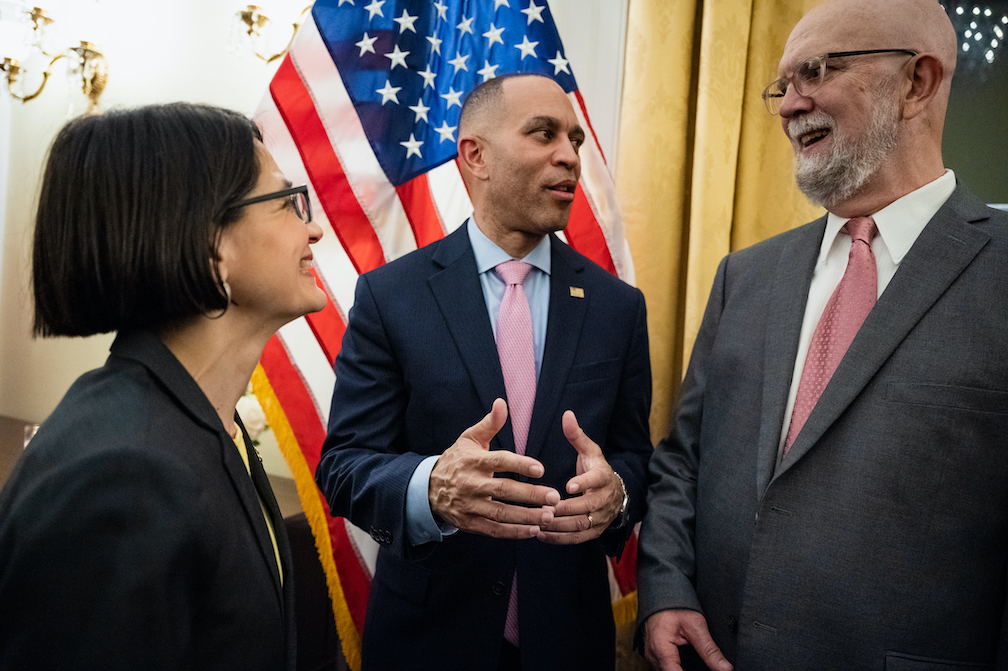
Vermont
The word “samara” means a seed, or winged seed pod, the kind that falls from a maple tree—especially fitting for the name of a philanthropic fund in Vermont.
“It floats down and brings new life. Its beauty is new life. The idea of Samara was to be a seed of projects that improve the quality of life and empower LGBTQ+ Vermonters,” says Elisabeth Marx, senior philanthropic advisor at Vermont Community Foundation’s Samara Fund.
The idea came from cofounder Bob Munstock. In 1991, he created Samara with Bill Lippert, the fund’s first director, both early AIDS activists who pushed for much of the original LGBTQ+ laws in Vermont, especially around access to health care, Marx recalls.
Munstock was also founder of the HIV/AIDS support nonprofit Vermont Cares.
When Munstock died of complications related to the AIDS virus, he left the initial gift that Lippert, working with fellow activist Bill Curtis, cultivated into what was then the Samara Foundation. (Lippert was also a force behind the creation of the first Pride parade in Burlington in the 1980s, a founding board member of youth-serving Outright Vermont, and as the first openly gay member of the Vermont General Assembly, vital in making Vermont the first state to grant civil unions to same-sex couples in 2000. He continued serving as Samara’s director through the 2000s.)
Samara’s early mission involved hands-on partnerships with the state’s emerging LGBTQ+ groups. But over the years, as these groups, like the Pride Center of Vermont, became stronger, Samara’s focus “became less about doing the actions—the groups were doing that—and they became more of a funder,” says Marx.
Samara started partnering with Vermont Community Foundation in the early ’90s when VCF President David Rahr accepted a $100K challenge grant from national funders and helped Samara raise the $200K required match, even though Samara initially chose to be independent from the VCF.
In 2011, the Samara Foundation converted into a fund at the Vermont Community Foundation. The goal was to build the capacity of Samara to serve Vermont’s LGBTQ communities. From 2011 to 2020, the Samara funds awarded an average of about $61,000 in grants annually (low $34,000, high $69,000) from earnings on the endowment, grants and major gifts, and Samara’s annual campaign.
More recently, the fund went through another growing spurt. During COVID, they took time to “pause, reflect and queer up how we approach every aspect of our work as a fund over the last year,” states the intro to their new, more equity-minded approach, which you can learn all about on their website.
“We did a lot of internal deep dive work. We had a couple of retreats, we had some change in our membership. We recruited new members very thoughtfully and intentionally,” says Samara Fund Advisory Board Member Mo Reilly, who describes the work as often difficult but ultimately well worth it, for both their organization and the grantees they serve. “I think we’ve made that committee stronger structurally.”
Says HB Lozito, executive director of Samara-grantee Out in the Open, “I know they’ve done a lot of their own strategic planning recently, about how they’re continuing to focus these funds on support for our community.”
Lozito describes Out in the Open as “a multiracial, mostly working-class, grassroots organization. Our mission is to connect rural LGBTQ people to build community visibility, knowledge and power, with a focus on what are all the various types of experiences that we have as rural LGBTQ people. We have staff who are based here in Vermont, as well as in Central and Mid-Coast Maine.”
“What the fund is doing in this very rural state is showing up for the people up and down the state, in Rutland, Bennington, St. Johnsbury, Bellows Falls,” says Marx. “We’re out there networking, and we’re doing much more with BIPOC groups, where there is so much overlap and synergy.”
Equity Fund, Maine Community Foundation
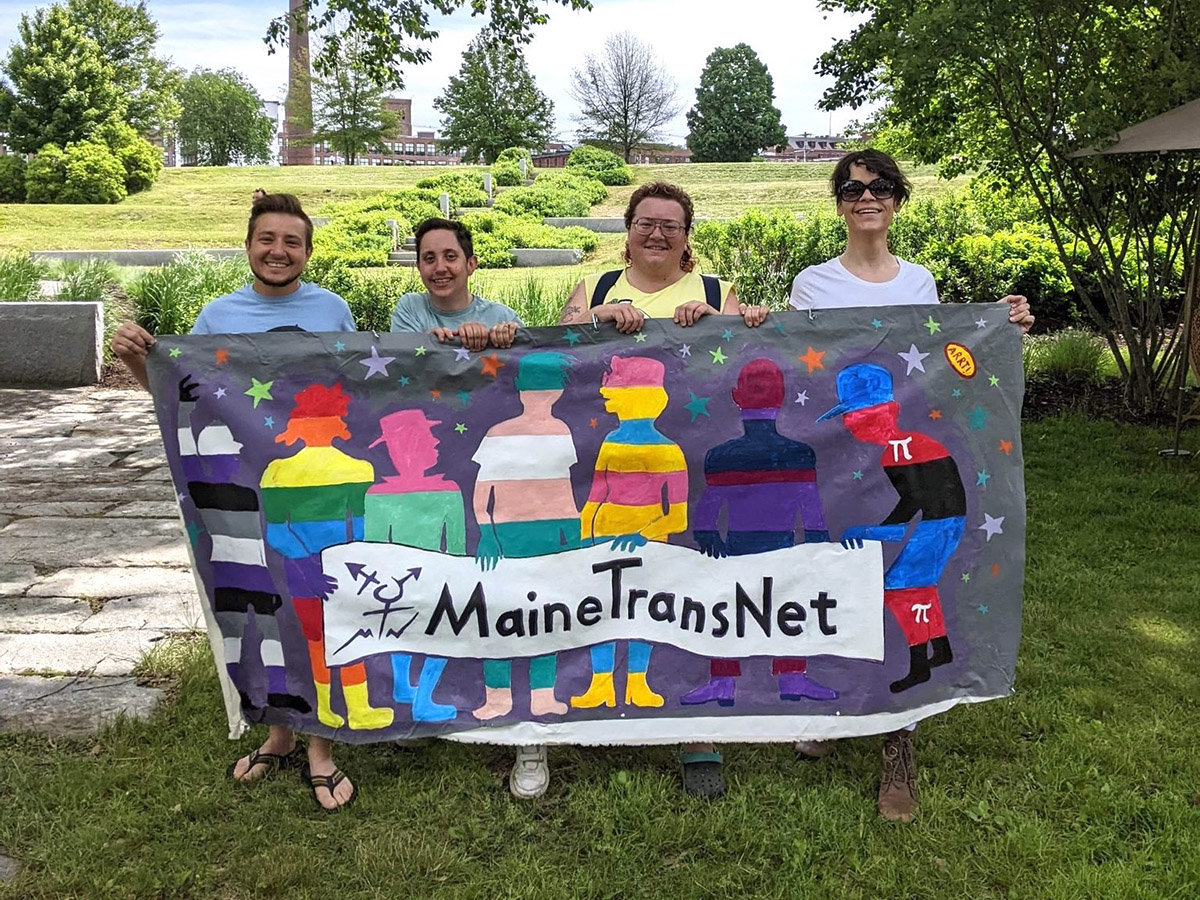
Maine
“With the unfortunate rise in hateful speech and actions against all kinds of communities around the country, our work is more important than ever,” says Gloria Aponte Clarke, senior community partner at Maine Community Foundation.
The challenge is especially intense, she adds, for the LGBTQ+ community.
“The organizations getting funded through MCF’s LGBTQ+ Equity Fund are the first line offense and defense, and I want to get them as many resources as possible with as large a grant budget as possible, then we can get more resources out there.”
The mission of MCF’s Equity Fund is to strengthen Maine’s LGBTQ+ organizations and support community-based initiatives. They do this through general support grants to LGBTQ+ orgs and with specific project grants for nonprofits that serve broader clienteles to specifically use for LGBTQ+ projects (like for gender-affirming care at a health-care facility).
“The fund really lifts up the visibility of the smaller nonprofits and programs doing great work,” says Aponte-Clarke. Case in point is MaineTrans.Net, “that’s bringing awareness and kindness and love to a community that is under fire right now. It’s been particularly brutal, and they’ve been providing valuable leadership and support to the community in a way that just is so impressive. It brings joy to my heart to see a nonprofit step up that way. It’s such important work.”
“Trans people are going into another election season as the political football,” says Bre Danvers-Kidman, executive director at MaineTrans.Net. “Being in the middle of a bipartisan clash about culture and values, it politicizes things that don’t need to be politicized. With that level of visibility comes a level of conflict that is very challenging, and so MaineTransNet does advocacy work to fight some of those battles. We’re just trying to live here, but this gets in the way.”
Where MaineTrans.Net really shines, says Danvers-Kidman, is their focus on trans joy and belonging through a host of services including support groups, retreats, art shows, even a pay-what-you-can thrift shop at their offices in the Equality Community Center in Portland.
“You can’t make any real sustainable change if you’re focusing on what you don’t want. What we do want,” Danvers-Kidman says, “is for every person, regardless of their gender, to have a place where they feel like they can just be themselves without it being a huge fight.”
Last year, the Equity Fund worked with its team of community advisors, leaders of the LGBTQ+ community, to award $106,500 in partnership with the Foundation’s Maine Health Access Fund chipping in an additional $40K. (Like other foundations profiled in these pages, the “sister” funds often work together.)
In addition to MaineTrans.Net, 2023 grantees received $500 to $10K and included Downeast Rainbow Alliance, Equality Community Center, Frannie Peabody Center, Hardy Girls Healthy Women, Mabel Wadsworth Women’s Health Center, Maine Family Planning, New Beginnings, OUT Maine, Portland Ovations, Queerly ME and The Carpenter’s Boat Shop.
“It’s a huge privilege to get to support the organizations and the advisors and get money into the hands of people doing really great things,” says Aponte-Clark. “I’m also sort of like a community resource for some of the nonprofits, some of the emerging orgs. I can help people understand key things for how to develop a nonprofit and give them connections to other funders that might help them.”
“This is incredibly rewarding work.”
Queer Care Fund, Reproductive Freedom Fund of New Hampshire
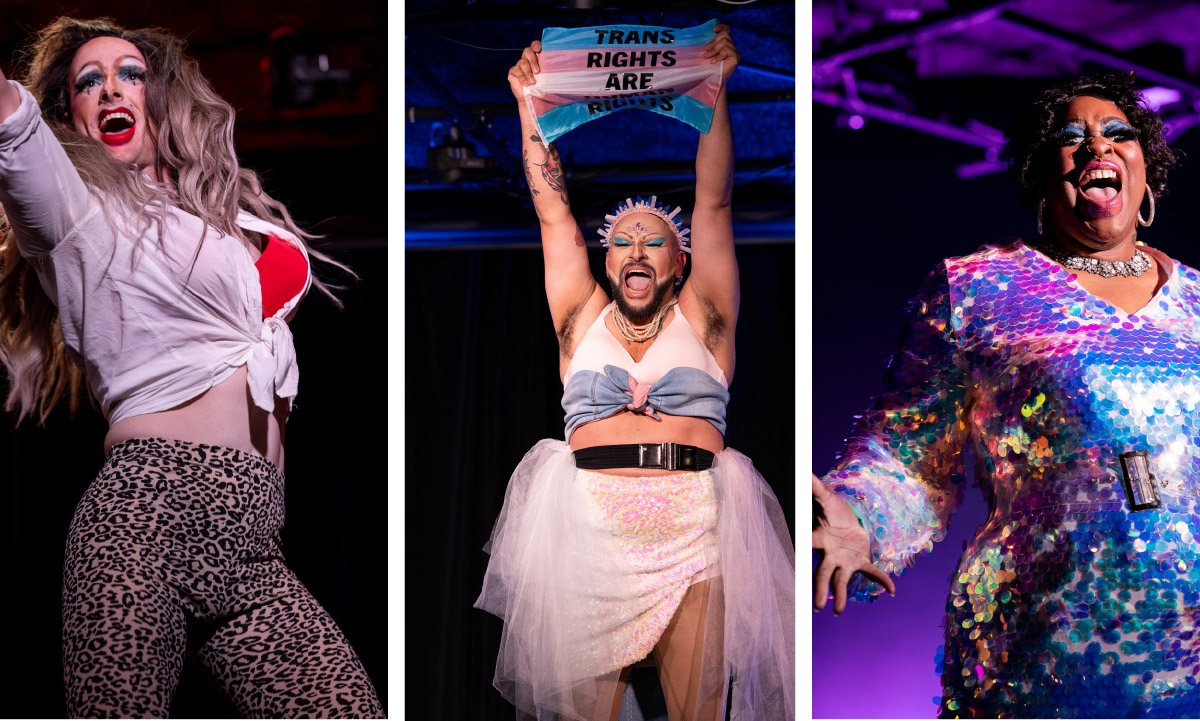
New Hampshire
Josie Pinto, executive director of the Reproductive Freedom Fund’s Queer Care Fund, sees a strong connection between the right for reproductive autonomy and transgender liberation. “We have the same enemies going after both of us,” they say. “The core fight is around bodily autonomy.”
And so, a year ago, with a $10K grant, Pinto started the Queer Care Fund as part of the Repro Fund, which Pinto also founded, to help transgender patients access health care. To date, through additional grassroots donations, more than $20K have gone to help more than 60 trans patients in the Granite State cover copays and appointments for gender-affirming treatments, including mental health visits. They’ve also been used for gift cards for transportation and medication and other necessary care for low-income trans patients without insurance.
The money is distributed directly to Equality Health Center in Concord and Lovering Health Center on the seacoast in Greenland to use, unrestricted, for trans care. “That’s been really great for them because it doesn’t pigeonhole them into, okay, this can only go for hormones or whatever,” Pinto says. “So they’ve actually gone on to use that fund a lot of times for those gas cards to help people pay for the cost of gas to appointments, or Visa gift cards so that when they pick up their prescriptions at the pharmacy, they have a way to pay for them.”
They also raise funds at “some really fun drag shows that bring people together, and make them feel safe and affirmed,” they add. “There so much power in just being unapologetically bold and out there fighting for liberation and connecting these struggles together.”
Feedback has been great. Many patients are in disbelief when they learn about Queer Care. “They’ll ask us questions to make sure they can really walk in and get covered,” Pinto says. “When you think of getting medical care, you think of all the hoops and barriers you have to jump through, all the annoying phone calls. What’s so nice about the work we do is that we get to be one bright light in the health care system in terms of just saying, we’re here to help you. We’re here to break down barriers. We’re here to make that easier.”
Pinto’s goal for the Queer Care Fund is very similar to that of the Reproductive Freedom Fund. “When I moved up to New Hampshire in 2017 from Massachusetts, I realized there was no abortion fund in the state,” they recall. The Bay State, Pinto says, has four. So in 2019, “I got together with a group of people, and we took about two years to figure out what we were going to be and fundraise, and we launched in 2019. Not only do they fund all abortion care for those in need in New Hampshire, they offer peer support, have a network of volunteer abortion doulas, fund hotel rooms and flights, offer gas and cards and manage a volunteer network of over 50 trained drivers to help get patients to appointment. On the prevention front, they provide free Plan B assistnce at coffee shops, bookstores and other locations throughout the state.
“There’s such a strong connection between the repro and LGBTQ+ movements,” says Pinto. “In a lot of ways they’re practically overlapped. My core message is, if you believe in bodily autonomy, if you were upset when Roe fell, you need to fight for LGBTQ+ people now too. Because it’s the exact same fight. That issue needs the kind of energy we had when Roe fell because they’re at that crisis moment now.”
Pride in the Hills Fund, Connecticut Community Foundation
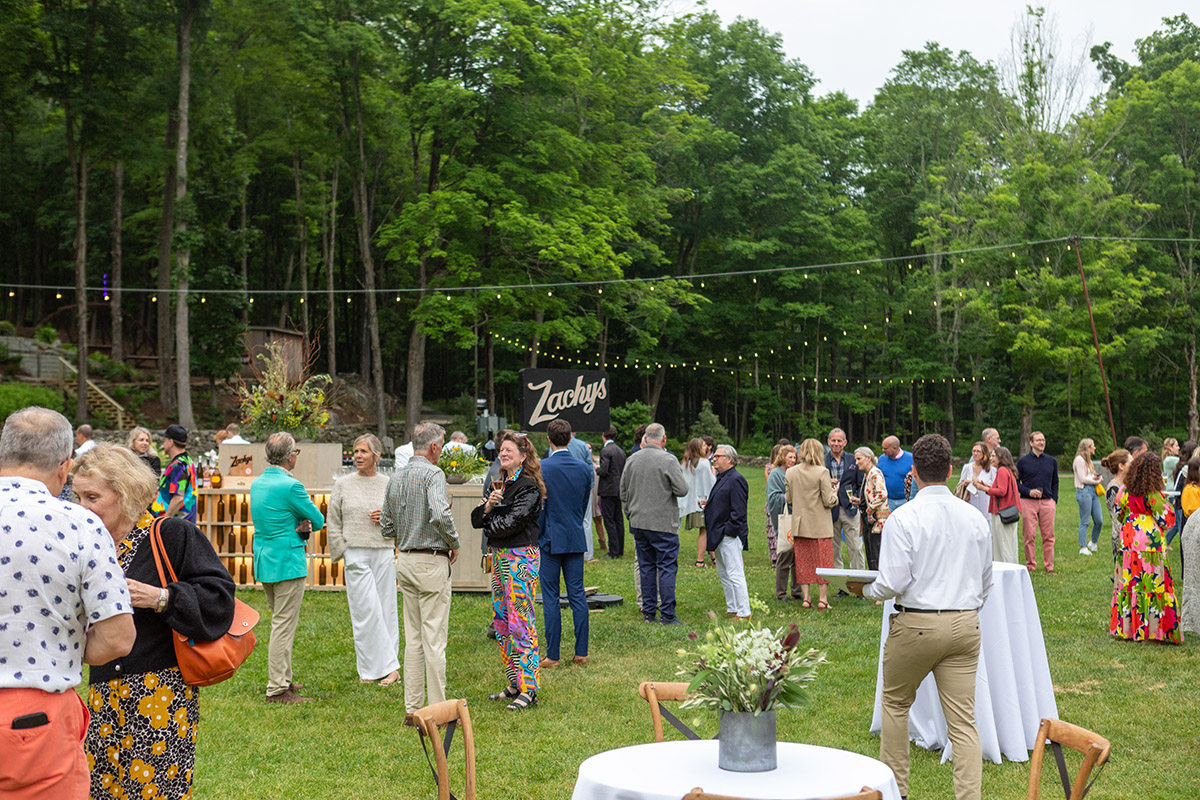
Connecticut
Chris Herrmann grew up in rural Vermont, and so this cofounder of Connecticut Community Foundation’s Pride in the Hills knows something about growing up gay and isolation. “It’s pretty gratifying to think I’m helping create a community where LGBTQ+ youth can feel safe, accepted, supported, included, not alone and isolated,” he tells us.
“If you ask me broadly what I’m most proud of, it’s that I’m part of an organization that is making people feel safe in our community and supported and not alone.”
The Pride in the Hills Advised Fund may be one of some 100 funds at Connecticut Community Foundation, which holds about $200 million in investments, but for the LGBTQ+ individuals and their families and friends, it is one of a kind.
“We are the first LGBTQ fund of its kind in the state of Connecticut,” Herrmann says. Their mission? “To fund programs that support, empower and create safe spaces for LGBTQIA+ Youth in Connecticut.” And the work it’s accomplishing creates a ripple effect that makes a safer, more inclusive environment for queer people of all ages.
In 2023, Pride in the Hills funded $38,760 to LGBTQ+ organizations and initiatives ranging from health care to youth leadership and social services to Pride events, like Greater Waterbury Pride at the Afro-Caribbean Cultural Center.
Since it launched in 2018, the fund’s sponsored 160 young people to attend the annual True Colors Convention in Storrs, the largest such conference in the US. It’s awarded 13 grants to high schools to support gay-straight alliance activities. It’s provided financial support to QUEST (Queer, Unity, Empowerment Support Team) of Waterbury for their Queer Youth Social Group, and is currently establishing a Leadership Academy for Waterbury youth under the auspices of QUEST. It’s also created three scholarships to LGBTQ+ high school seniors in partnership with the Connecticut Community Foundation Scholarship program.
Pride in the Hills has contributed Rainbow Reader Libraries to five area libraries in conjunction with GLSEN’s Gay, Lesbian & Straight Education Network. It’s sponsored Team B Out of Darkness Walk for the CT Chapter of the American Foundation for Suicide Prevention. It supports the statewide LGBTQ+ advocacy group Equality Connecticut. And it partners with Nuvance Health to expand their educational programming for clinicians and staff by underwriting three annual Grand Rounds on a topic related to LGBTQ+ health care, each featuring a distinguished guest speaker.
The fund also hosts the annual Quassy Friend and Family Day at the landmark Quassy Amusement & Waterpark on the shore of Lake Quassapaug. Last year, over 400 LGBTQ+ youth, families and friends attended. (This year’s event is on June 22).
Pride in the Hills funds come from the donations from local individuals and businesses. They host two fundraising events during Pride month: a shindig around New Preston Pride at The Owl restaurant, right in the middle of town, and a charity auction, which raised about $35K last year. And then there’s the annual festival event—SHAG with Pride (SHAG standing for the Spring Hill Vineyards Arts Gathering)—slated for fall this year.
“Another thing I’m really proud about for Pride in the Hills,” says Herrmann, “we’ve made our events destination events. When we have an event with 900 people here in our area, you know those 900 people are not just from Washington, Connecticut. People from all over New England are coming. They’re driving in from the surrounding states.”
Pride in the Hills may be working mainly in northwest Connecticut, but they’re talking with other foundations interested in partnering to create a fund that would serve the whole state. “Wouldn’t it be great if we could serve as models for funds all over the country?”
Equality Fund, Hartford Foundation
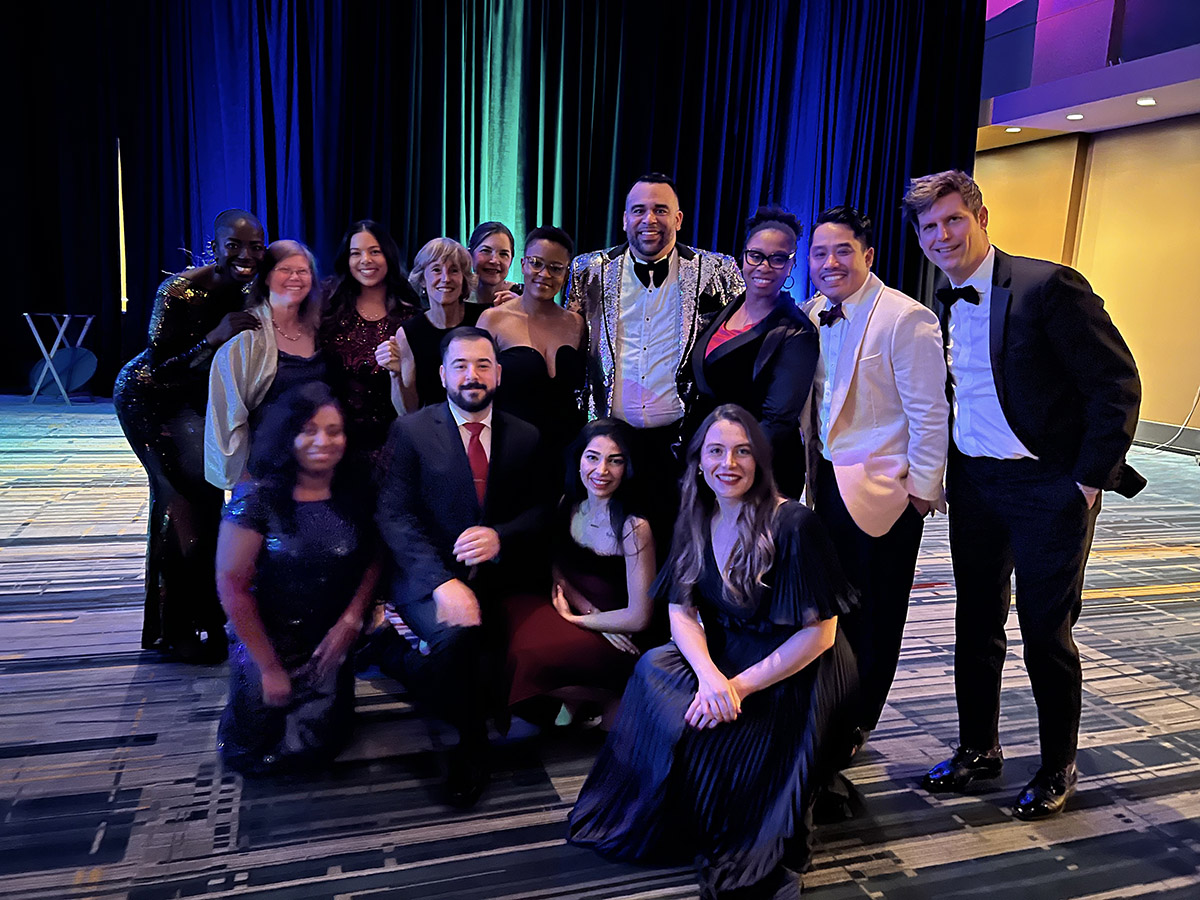
Connecticut
Joel Roskin, long-term donor to the Hartford Foundation for Public Giving, had a vision. He imagined a permanent fund to empower individuals of diverse sexual orientations, gender identities and gender expression in the Greater Hartford area.
In 2018, his vision became a reality when Roskin set up an endowment and the Equality Fund was born.
“Joel wanted the fund to be used for direct assistance or services for individuals, particularly youth. He did a lot of grant-making with younger folks during his lifetime,” says Deborah Rothstein, vice president for development at the Hartford Foundation, home of the Equality Fund.
Though still in its development stage, the fund has already made its first distributions: one to Hartford Gay and Lesbian Health Collective, another to Advancing Connecticut Together, an umbrella organization that includes Connecticut Pride and AIDS Connecticut, and another to Q Plus (Queer Youth Program of CT).
Overall, the goal is to target key areas such as basic human needs, education, elder services, health and employment, and programs that address challenges in equities and barriers.
And the fund is not just about money, Rothstein explains. “Of course, we care about money and grants going out. But this is also a way for us to convene people in the community around issues that are important to them.”
One such convening happened in April, with a gathering to celebrate, introduce and discuss a new report on the LGBTQIA+ wellbeing of Greater Hartford residents. The Foundation funded the report, created by its long-term partner DataHaven. The convening was an opportunity for the community to gather and talk about how the data resonates, and to begin crafting solutions for critical issues facing the LGBTQ+ community.
“Part of the ethos of the Hartford Foundation is that we’re a learning organization,” says Kate Szczerbacki, director of learning, evaluation and capacity building. How the Equity Fund will be administered, she stresses, will come from solid knowledge around the LGBTQ+ community’s “strengths, assets, needs and gaps in services. Data, especially around sexual orientation and gender identity, is not particularly strong. It’s something that is often left off of data collection efforts. It’s been in and out of the Census,” for example, she adds.
“We do have informal ways of understanding our LGBTQ+ community, especially through our relationships with our grantee partners or public entities. Also, our own lived experiences as queer folks who work at the foundation. But I think this is something that we wanted to have a very good grounding in before we attempted to be strong grant makers within the LGBT community.”
So they got to work and found the data, created the report.
“I think the report really serves a dual purpose,” Szczerbacki says. “We have the immediate benefit of strengthening the data ecosystem around the understanding of what quality of life is for LGBTQ+ folks. And then we have a longer-standing benefit of pulling all that information together in a compilation, where folks really wanting to work in and with the queer community, can say, ‘Let’s reflect on this and let it drive our action.’ And I think, for the foundation, that’s going to ground our grant-making and how we can strengthen partnerships in the community.”
“I’m a data person,” says Szczerbacki. “One of the maxims of my professional and personal career is that data are people. And we often don’t see queer folks showing up in data sets and their voice is not being heard. And that kind of invisibility and erasure is harmful, and harmful to us all as a society.”
Adds Rothstein, “I want our community members to know that we care, and we’re here, and you’re part of us.”
Just as Joel Roskin had imagined. Making the dream come true.


